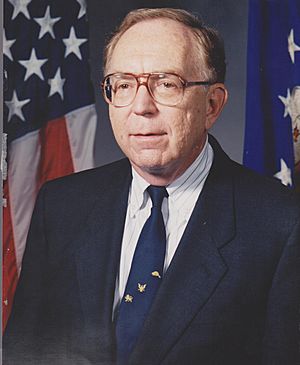Edward Feigenbaum facts for kids
Quick facts for kids
Ed Feigenbaum
|
|
|---|---|

Feigenbaum in 1994
|
|
| Born |
Edward Albert Feigenbaum
January 20, 1936 |
| Education | Carnegie Mellon University (BS, MS, PhD) |
| Known for | Expert systems EPAM DENDRAL project Feigenbaum test |
| Awards | Turing Award (1994) Computer Pioneer Award AAAI Fellow (1990) ACM Fellow (2007) |
| Scientific career | |
| Fields | Computer science Artificial intelligence |
| Institutions | Stanford University United States Air Force |
| Doctoral advisor | Herbert A. Simon |
| Doctoral students |
Ramanathan V. Guha
|
Edward Albert Feigenbaum, born on January 20, 1936, is a famous computer scientist. He is known for his work in artificial intelligence (AI). He won the Turing Award in 1994, which is like the Nobel Prize for computing. Many people call him the "father of expert systems."
Early Life and Learning
Edward Feigenbaum was born in Weehawken, New Jersey, in 1936. He grew up in North Bergen, New Jersey. At 16, he started college early. He went to Weehawken High School, which helped him get ready for college. In 1996, his high school honored him in their hall of fame.
He earned his first degree in 1956. Then, he completed his PhD in 1960. Both degrees were from Carnegie Institute of Technology, now called Carnegie Mellon University. For his PhD, he worked with Herbert A. Simon. He created a computer program called EPAM. This program was one of the first to show how computers could learn like people.
During college, he took a class with Herbert Simon. Simon talked about a new invention called the Logic Theorist. He said, "Al Newell and I invented a thinking machine." This idea excited Feigenbaum a lot. He read a manual for an IBM 701 computer. He later said it was a "born-again experience" for him.
Career and Discoveries
After college, Feigenbaum received a special scholarship. He then taught at the University of California, Berkeley, starting in 1960. In 1965, he joined Stanford University. He helped start its computer science department. He also led the Stanford Computation Center for a few years.
He created the Knowledge Systems Laboratory at Stanford. This lab worked on important projects. Many of these projects helped in medicine. Some examples include ACME, MYCIN, and Dendral. He also helped start two companies, IntelliCorp and Teknowledge.
Teknowledge was founded in 1981. It was started by many computer scientists. Their goal was to help businesses use "knowledge systems." These systems allowed computers to use human-like knowledge.
In 2000, Feigenbaum became a Professor Emeritus at Stanford. This means he retired but is still connected to the university. Some of his former students became famous scientists too. These include Peter Karp, Niklaus Wirth, and Alon Halevy.
Awards and Recognition
Edward Feigenbaum has received many important awards for his work.
- 1986: He became a member of the National Academy of Engineering. This was for his work on expert systems.
- 1994: He won the Turing Award with Raj Reddy. They were honored for creating large AI systems. Their work showed how useful AI could be in real life.
- 1997: The U.S. Air Force gave him an Exceptional Civilian Service Award.
- 2007: He was named a fellow of the Association for Computing Machinery (ACM).
- 2012: He became a fellow of the Computer History Museum. This was for his pioneering work in AI and expert systems.
- 2013: He received the Computer Pioneer Award. This award recognized his early work in AI. It also honored his development of knowledge-based systems.
See also
 In Spanish: Edward Feigenbaum para niños
In Spanish: Edward Feigenbaum para niños
 | May Edward Chinn |
 | Rebecca Cole |
 | Alexa Canady |
 | Dorothy Lavinia Brown |

